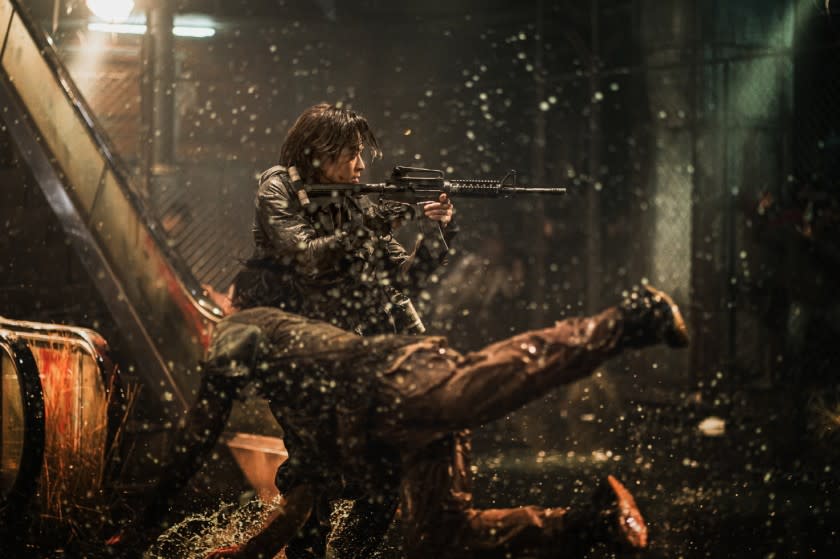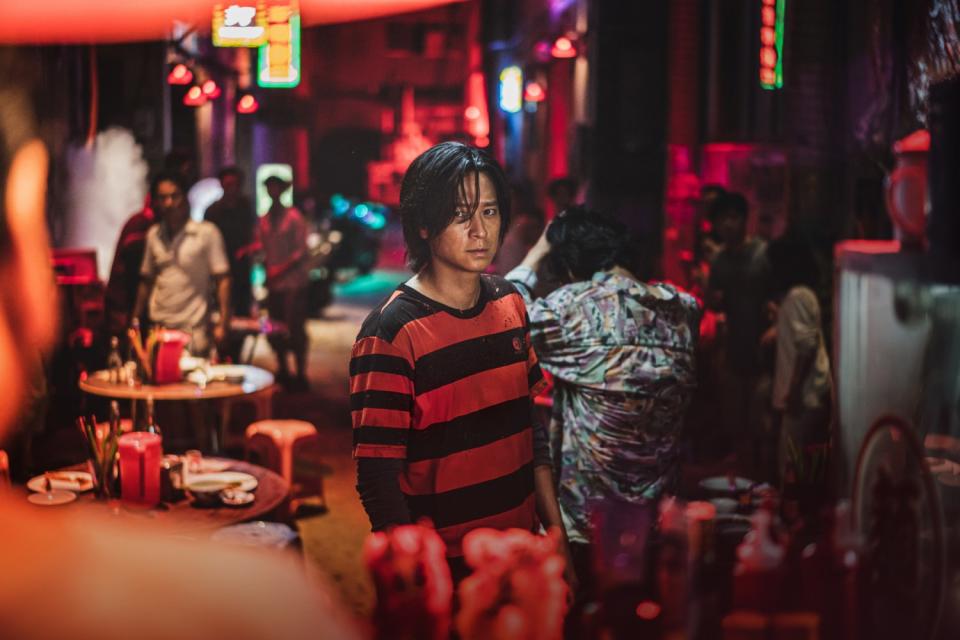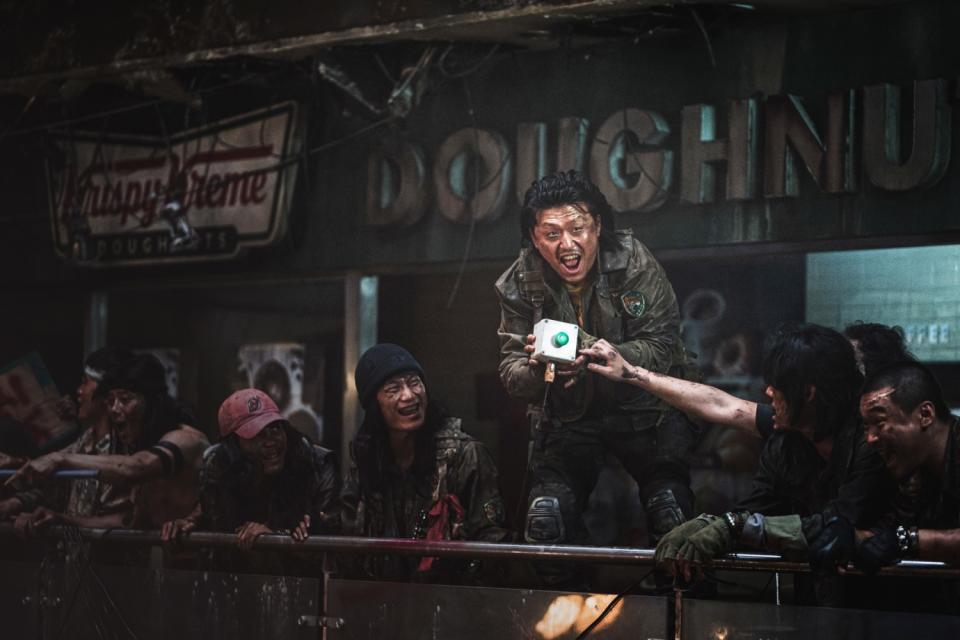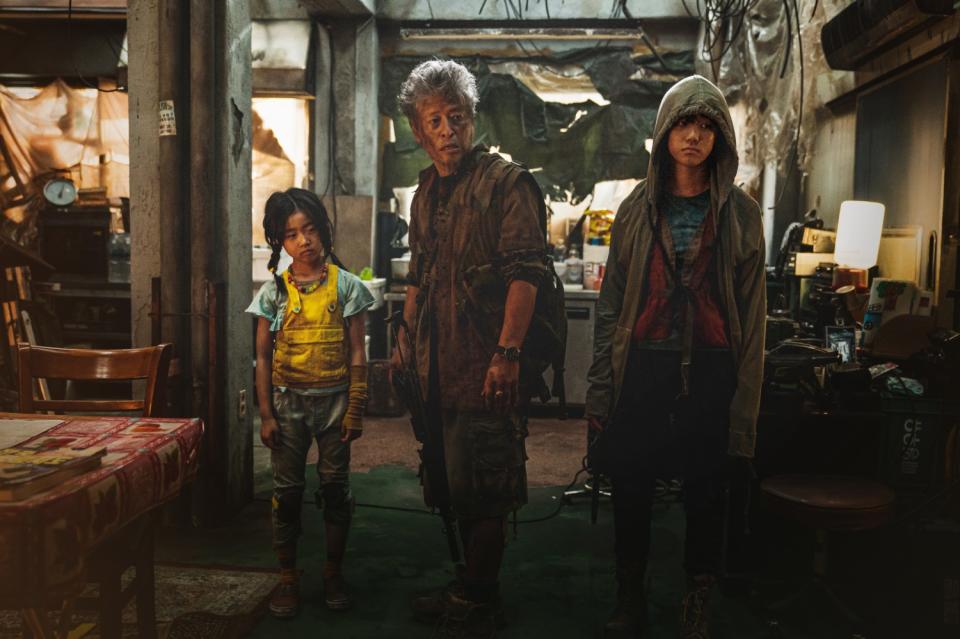Review: In the zombie apocalypse, 'Train to Busan' sequel 'Peninsula' derails itself

The Los Angeles Times is committed to reviewing new theatrical film releases during the COVID-19 pandemic. Because moviegoing carries inherent risks during this time, we remind readers to follow health and safety guidelines as outlined by the CDC and local health officials. We will continue to note the various ways readers can see each new film, including drive-in theaters in the Southland and VOD/streaming options when available.
These days it can be oddly comforting to settle in for a movie like "Peninsula," the third entry in the “Train to Busan” horror franchise. Set in a bleak future teeming with rabid zombies and even more bloodthirsty bad guys, the sequel is a stab at world-expanding that veers off the rails as it reaches for dazzle over depth, rounding out the hit film series somewhere between a whimper and a bang. Yet amid all the firefights and car chases and people-munching action, it nails some truths of the genre: Zombies are simple creatures with simple, uh, needs. It's humans who complicate matters.
Most of director Yeon Sang-ho's slick sci-fi vision is just enough removed from our own pandemic reality to serve as a welcome escape from 2020's kaleidoscope of horrors. In a prologue set early in the epidemic on the heels of the commuter chaos of "Train to Busan," we meet Marine Capt. Jung-seok (Gang Dong-won, "Haunters") as he flees the country with his sister and her family. He makes a panicked decision that will come back to haunt him — but not as much as the tragedy that unfolds on their escape boat to Japan, where unknown to the passengers the virus has made its way aboard.

Four years later, Jung-seok is among a group of expats living in squalor in Hong Kong. What used to be South Korea is now a zombie-infested fallen nation siloed away from the rest of the world, which we learn in a clumsy bit of exposition by glib white Westerners on a talk show. Blamed for the virus, the Koreans endure open xenophobia and discrimination — an eerily prescient parallel to real life in the age of corona. Life is so miserable that when a tantalizing Offer Too Good To Be True sends Jung-seok, his brother-in-law Chul-min ("The Wailing's" Kim Do-yoon) and two other desperate refugees back to their homeland to retrieve a lost cache of money, the idea doesn't seem half-bad.
As it turns out, it's a terrible idea. Things go south quickly, which is where director Yeon starts to have fun pushing the boundaries of the world of "Busan." With an army of VFX artists at his disposal and cinematographer Lee Hyung-deok lensing the faux-grimy sets in an artificial sheen, he throws open the doors of his cinematic universe into a new dystopian landscape in which the endless sea of faceless zombies, with their terrifying speed, hunger for flesh and heightened senses, aren't really the ones to be afraid of.
That distinction goes to the armed militia occupying a fortified outpost in the heart of Incheon (not to mention the opportunistic foreign gangsters behind the mission). Long ago abandoned by their own superiors, the soldiers, led by the suicidal-depressive Capt. Seo (Koo Gyo-hwan) and the sadistic Sgt. Hwang (Kim Min-jae), have fashioned a nihilistic subsociety from the ashes, scavenging for supplies and pitting prisoners vs. zombies for sport. Here at Unit 631, despair has made barbarians of those who once served their country. And who can entirely blame them, the film suggests, in subtext we're seeing mirrored today: Faced with the unthinkable, how would any of us, any nation or people, endure the ultimate stress test?
Unfortunately, attempts at bigger-picture social commentary in the script by Yeon and Ryu Yong-jae fall short of the bar set by both 2016's excellent "Train to Busan" and the sublimely nuanced "Seoul Station," the feature-length animated prequel Yeon made in the same year. "Seoul Station," a scathing indictment of economic exploitation and neglect, follows as the epidemic is first unleashed amid a community's tragic lack of empathy. In "Train to Busan," selfishness and corporate greed sharply combine to accelerate and exacerbate the literal dehumanization of the population.
In ramping up the stakes for his trilogy ender, Yeon aims for the rafters but neglects to meaningfully fill the space, unleashing lesser-compelling personalities and derivative plot turns upon the wide-open ruins of weightless, overly-CG cityscapes while gesturing toward grander geopolitical implications that don't cohere.

Bigger isn't better, even if some sets, like the zombie-baiting arena built in the ruins of a shopping mall, set the stage for dynamic battle sequences. Absent the story development to match, "Peninsula's" supersized scale more often starts to drown its characters before the zombies get a chance to finish them off. One longs for the claustrophobic pressure-cooker confines of that zombie-infested train.
Instead, "Peninsula" revels in fast-paced set pieces, including a spectacular 20-minute predawn car chase, while painting its characters in broad strokes. The results feel ploddingly familiar. At times it recalls two different "Mad Max" films ("The Road Warrior" and "Fury Road"), George A. Romero's zombie sequel "Land of the Dead," and, refreshingly, the "Fast & Furious" movies. The last turns out to be one of the film's bright spots, livening up a serviceable plot when a young girl behind the wheel of a speeding car coolly Tokyo Drifts through hordes of zombies like the newest member of Dom Toretto's squad.
The young drift queen's name is Jooni (played by 14-year-old actress Lee Re), and with her precocious little sister Yu-jin (Lee Ye-won), a pint-sized RC car obsessive, she zooms into the picture just in time to steal the movie. If only the film focused more on how these kids and their tough-as-nails mother, Min-jung (Lee Jung-hyun), survived the zombie-ravaged wasteland in the first place, or how they formed a makeshift family unit with the elderly Mr. Kim (Kwon Hae-hyo), the grandfatherly ex-military officer still holding out hope for rescue.

The 115-minute runtime rather hangs on the shoulders of movie star Gang, who does his best to convey the torture of a man driven by a vague sense of ... guilt? Loss? It's never clear nor satisfying. As he guns his way through "Peninsula's" dystopian action racking up zombie headshots, an overwrought score trumpets the emotional stakes with the subtlety of a Michael Bay blockbuster, as if Yeon doesn't trust the story to land with any weight on its own.
"Peninsula" squanders an otherwise potent zombie metaphor by serving up far less to chew on than its predecessors. The franchise is more successful when it illustrates in human moments how an apocalypse might force us to choose the person we want to be. Take a cue: Wear a mask, wash your hands, be kind to others — and watch "Seoul Station" instead.

